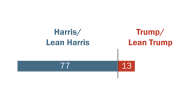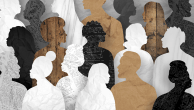When it comes to how Black people are treated in the United States, most Black adults think several major U.S. institutions need large-scale changes to ensure fairness. They are particularly critical of various aspects of the criminal justice system, including policing, prisons and the courts. Despite this criticism, the majority of Black adults want funding for police departments in their communities to stay the same or increase. The survey also shows that while Black adults want these systems to change for the better, few think such improvements are likely.
Black adults say the criminal justice system needs to be completely rebuilt
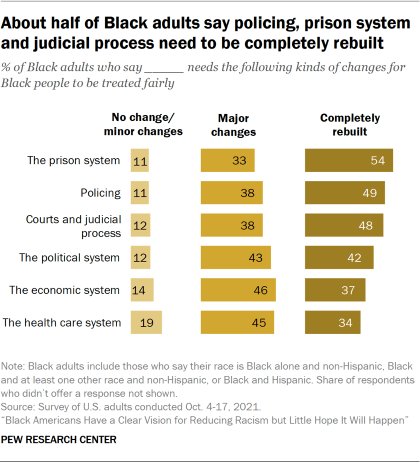
Nearly nine-in-ten Black adults say policing (87%), the courts and judicial process (86%), and the prison system (86%) require major changes or need to be completely rebuilt for Black people to be treated fairly. Only around one-in-ten Black adults say that each system requires minor changes or no changes at all. Black adults differ by age, education, income, party, voter status and their views about racism on the kinds of changes they would like to see.
Policing
Nearly nine-in-ten Black adults (87%) say policing needs large-scale changes for Black people to be treated fairly: 38% say it needs major changes, and about half (49%) of Black adults say that policing needs to be completely rebuilt. Only 11% say policing needs few or no changes for Black people to be treated fairly. (For details, see supplemental tables.)
The oldest Black adults (50%) are more likely than their younger peers to say policing needs major changes to treat Black people fairly. However, Black adults ages 30 to 49 (52%) and 50 to 64 (48%) are slightly more likely than those 65 and older (42%) to say policing needs to be completely rebuilt to ensure fair treatment.
Black adults also differ by education and income on policing. Black adults with a bachelor’s degree or higher level of education (43%) are more likely than those who attended college but do not have a bachelor’s degree (38%) and those who have a high school diploma or less education (34%) to say policing needs major changes for Black people to be treated fairly. However, Black adults with a high school education or less (17%) are more likely than those with a bachelor’s degree (7%) or those with some college but no four-year degree (7%) to say policing requires few, if any, changes to treat Black people fairly.
Black adults differ modestly by income on this question. Those with upper incomes (43%) are more likely than those with lower incomes (35%) to say policing requires major changes. Meanwhile, about one-in-ten Black adults with lower incomes (11%) say policing only requires minor changes for Black people to be treated fairly.
Black adults also differ by political party in their views on policing and fair treatment. Black Democrats (52%) are more likely than Black Republicans (29%) to say policing needs to be completely rebuilt for Black people to be treated fairly. Conversely, one-in-three Black Republicans (33%) say policing requires no changes or only minor changes to ensure fair treatment. Only 8% of Black Democrats say the same.
Black adults who view racist laws as a bigger problem for Black people in society than racist individuals (59%) are more likely than those who view racist individuals as the bigger problem (41%) to say policing needs to be completely rebuilt for Black people to be treated fairly.
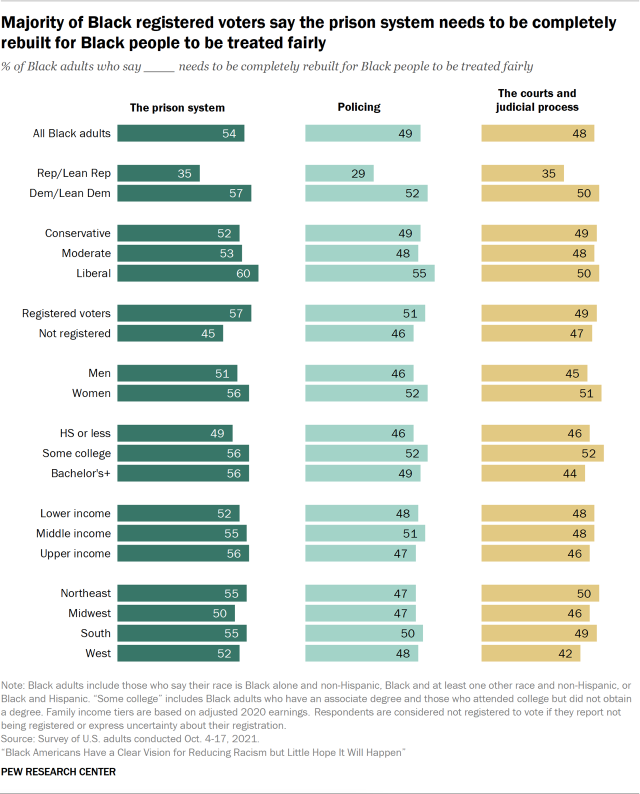
The courts and judicial process
A large majority of Black adults (86%) say the courts and judicial process in the United States require major changes or needs to be completely rebuilt for Black people to be treated fairly. This includes 38% who say this system needs major changes and 48% who say it needs to be completely rebuilt. Only 12% of Black adults say the judicial process needs no changes or only minor changes for Black people to be treated fairly.
Black adults 65 and older (51%) are more likely than their younger counterparts to say the judicial process needs major changes. However, Black adults ages 30 to 49 (49%) and 50 to 64 (48%) are slightly more likely than those 65 and older (41%) to say the judicial process needs to be completely rebuilt.
Black adults with a bachelor’s degree (46%) are more likely than those who attended college but do not have a four-year degree (38%) and those who have a high school diploma or less education (32%) to say the judicial process needs major changes. And Black adults with upper incomes (43%) are more likely than those with lower incomes (35%) to say this.
Black Democrats (50%) are more likely than Republicans (35%) to say the judicial process needs to be rebuilt for Black people to be treated fairly. However, nearly one-third of Black Republicans (31%) say the judicial process needs only minor changes or no changes at all.
Black adults differ on this question based on their views about racism in society. Those who say that racist laws are a bigger problem for Black people than racist individuals (60%) are more likely to say the judicial process needs to be completely rebuilt than those who say racist individuals are the bigger problem (37%). Those who say racist individuals are a bigger problem (45%) are more likely to say the judicial process needs major changes but does not need to be rebuilt.
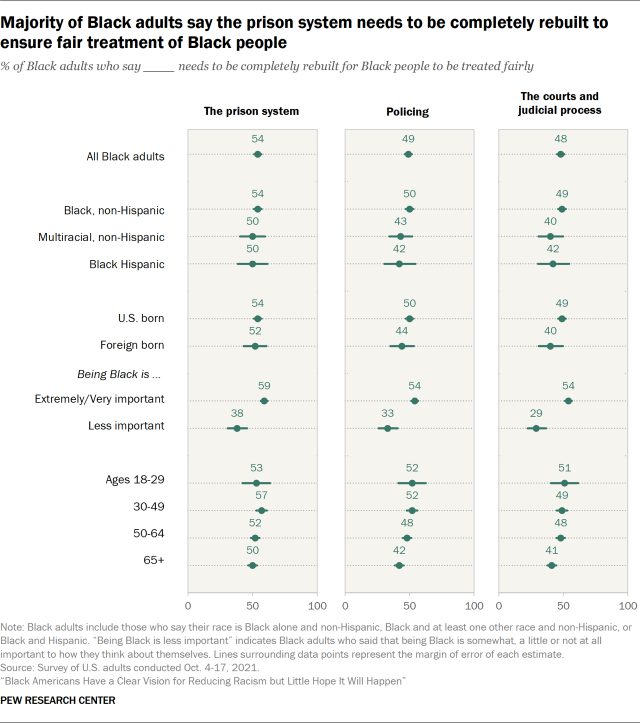
Prisons
The majority of Black adults (86%) say the prison system needs to change for Black people to be treated fairly; this includes 33% who say that the prison system needs major changes and 54% who say it needs to be completely rebuilt. Only 11% of Black adults say the prison system needs minor changes or none at all to ensure fair treatment.
Black adults ages 65 and older (40%) are slightly more likely than all other age groups to say the prison system requires major changes for Black people to be treated fairly. However, Black adults ages 30 to 49 (57%) are slightly more likely than those 50 to 64 (52%) or 65 and older (50%) to say the prison system needs to be completely rebuilt.
Black Democrats (57%) are more likely than Black Republicans (35%) to say the prison system needs to be completely rebuilt for Black people to be treated fairly. Among Democrats, those who identify as liberal (63%) are more likely than those who identify as moderate (54%) to say the prison system needs to be completely rebuilt. Black Republicans (27%) are more likely than Democrats (9%) to say that prisons require either minor changes or no changes at all to treat Black people fairly.
Black adults who say racist laws are a bigger problem for Black people than racist individuals (67%) are more likely than those who say racist individuals are the bigger problem (42%) to think that the prison system needs to be completely rebuilt to ensure that Black people are treated fairly.
Black Americans who want improvements are skeptical about the likelihood of change in the criminal justice system
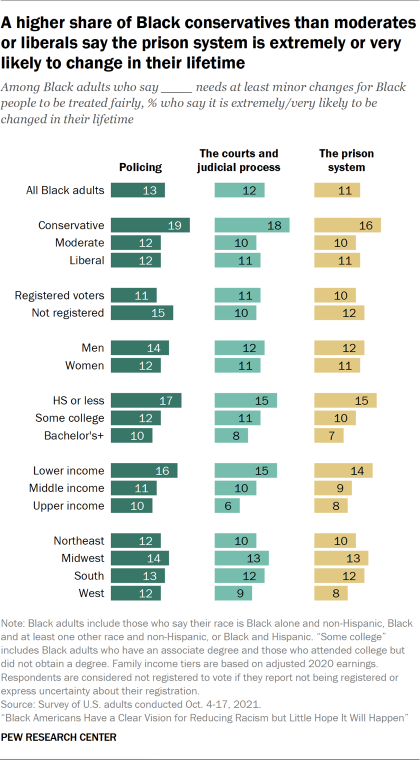
In addition to asking how much change Black adults thought was necessary to fix each system, the survey also asked those who said a system needed change how likely this change was.
Among Black Americans who say the criminal justice system needs at least minor changes, only about one-in-ten say policing (13%), the courts and judicial process (12%) or the prison system (11%) are extremely or very likely to change in their lifetime.
Black Americans who want these systems to change vary in saying that these systems are only somewhat likely to change, from 28% for policing to 21% for the prison system. However, the majority of Black Americans who want these systems to change say the prison system (67%), the judicial process (65%) and policing (58%) are a little or not at all likely to change in their lifetime.
Although few Black Americans say the criminal justice system is likely to change, some demographic groups are more optimistic about change than others. About one-in-six Black adults with a high school diploma say policing (17%), the prison system (15%) and the judicial process (15%) are extremely or very likely to change; this makes them more likely than Black adults with a bachelor’s degree to say this. Black adults with lower incomes are also slightly more likely than those with middle and upper incomes to say that policing (16%), the judicial process (15%) and the prison system (14%) are extremely or very likely to change in their lifetime.
Black Republicans (21%) are more likely than Black Democrats (13%) to say policing is extremely or very likely to change in their lifetime. However, there are no partisan differences on the likelihood that the prison system (16% vs. 11%) or the judicial process (15% vs. 12%) will change. And about one-in-six Black adults who say racist individuals are a bigger problem for Black people in society than racist laws say policing (16%), the judicial process (15%) and the prison system (14%) are extremely or very likely to change. Black adults who say that racist laws are a bigger problem than racist individuals are less likely to think that any of these systems will change in their lifetime.
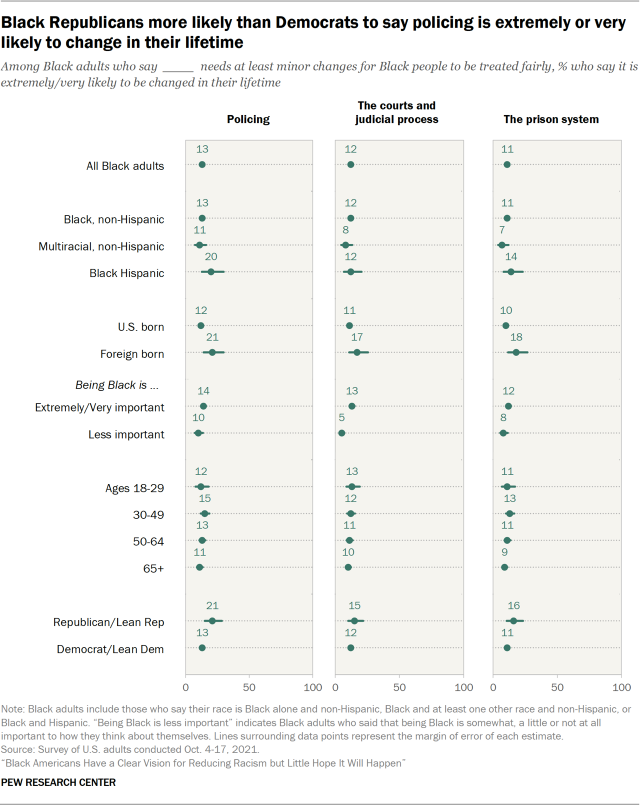
Black adults say political, economic and health care systems need major changes to ensure fair treatment
Black adults are not only critical of the criminal justice system when it comes to race and fair treatment. They also say other major U.S. institutions need significant improvements to ensure Black people are treated fairly. Roughly eight-in-ten Black adults say the political system (85%), economic system (83%) and health care system (79%) require major changes or need to be completely rebuilt for Black people to be treated fairly. Much like their views on the criminal justice system, Black adults differ by age, education, income and party on the kinds of changes they would like to see. Black adults who are younger, have more formal education, have lower incomes or are Democratic are more in favor of drastic systemic change than their older, more educated, higher-income and Republican counterparts.
Black adults 65 and older are more likely than their younger counterparts to say that the political system (53%), economic system (56%) and health care system (57%) need major changes for Black people to be treated fairly. However, Black adults under 30 are slightly more likely than those 65 and older to say the health and political systems need to be completely rebuilt.
Roughly half of Black adults with a bachelor’s degree say the political (51%), economic (55%) and health care (54%) systems need major changes – more than the shares among those without a bachelor’s degree who say each.
However, Black adults who attended college but did not obtain a bachelor’s degree (44%) are more likely than those with a bachelor’s degree (38%) to say the political system needs to be rebuilt. Black adults with a high school diploma or less education (37%) are more likely than those with a four-year degree (30%) to say the health care system needs to be completely rebuilt.
About half of Black adults with middle and upper incomes say that the political, economic and health care systems require major changes for Black people to be treated fairly; fewer Black adults with lower incomes say the same. Meanwhile, about four-in-ten Black adults with lower incomes say these systems need to be completely rebuilt to ensure fair treatment, higher than the share of Black adults with upper incomes who say this. And Black Democrats are more likely than Black Republicans to say the political (43% vs. 31%), economic (39% vs. 26%) and health care (36% vs. 26%) systems need to be completely rebuilt for Black people to be treated fairly.
Black conservatives, those with lower levels of education and income most likely to say that systemic change will occur in their lifetime
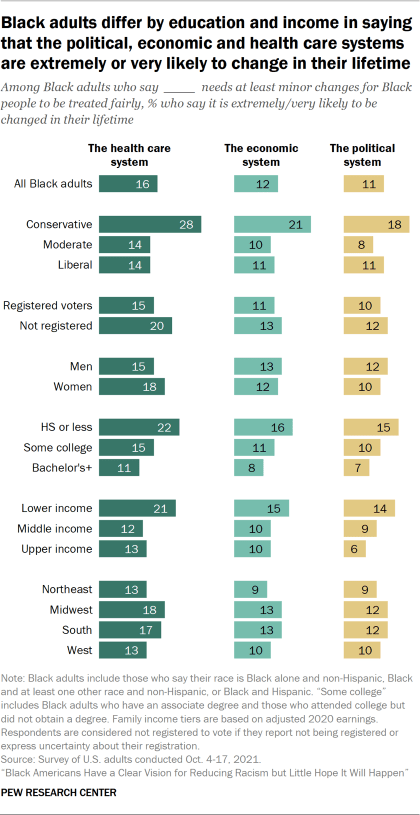
Among Black Americans who say that each of these systems needs at least minor changes, very few think that these changes are likely. While 16% of Black adults who want change think changes to the health care system are extremely or very likely in their lifetime, only about one-in-ten say the same about the economic system (12%) and the political system (11%).
In fact, about half (51%) of Black adults who say the health care system needs to change for Black people to be treated fairly say that such change is a little or not at all likely in their lifetime. About six-in-ten say the same about the political system (63%) and the economic system (62%).
Among Black adults who want change, those with a high school diploma or less are more likely than those with at least a bachelor’s degree to say that changes to the health care (22% vs. 11%), economic (16% vs. 8%) or political (15% vs. 7%) systems are extremely or very likely to occur in their lifetime. And Black adults with lower incomes are more likely than those with middle and upper incomes to say the same about the health care and political systems.
Black adults who identify as politically conservative (28%) are more likely than moderates (14%) or liberals (14%) to say that the health care system is extremely or very likely to change in their lifetime. Likewise, Black conservatives are more likely than Black moderates and liberals to say the economic (21%) and political (18%) systems are extremely or very likely to change in their lifetime.
Most Black adults say funding for police departments should stay the same or increase
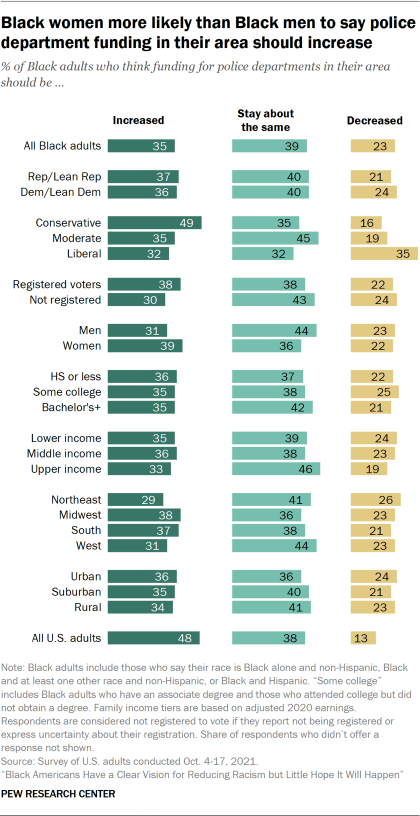
Aside from questions on the fair treatment of Black Americans in various systems, Black adults were asked specifically about funding for police departments in their communities and if those funds should increase, decrease or stay the same. Those who said funds should decrease shared their views on where that money should go.
About four-in-ten Black adults (39%) say that when thinking about police departments in their area, spending on policing should stay the same, while 35% say it should increase. And 23% of Black adults say funding should be decreased. Black adults differ across demographic groups on what should happen to police funding.
Black adults do not differ by party on this question. Similar shares of Black Democrats and Republicans say that funding should increase (36% and 37%, respectively), stay the same (40% each) or decrease (24% and 21%).
Black adults who identify as politically conservative (49%) are more likely than those who identify as moderate (35%) or liberal (32%) to say spending on policing should increase. Meanwhile, Black adults who identify as liberal (35%) are more likely than moderates (19%) or conservatives (16%) to say funding should be decreased.
Non-Hispanic Black adults (36%) are more likely than multiracial Black adults (25%) to say funding for police should increase, though roughly four-in-ten non-Hispanic (39%), multiracial (40%) and Hispanic (38%) Black adults say funding should remain the same.
Black adults ages 65 and older (50%) are more likely than their younger counterparts to say funding for police in their communities should increase. However, Black adults ages 18 to 29 (36%) and those 30 to 49 (26%) are more likely than those 50 to 64 (17%) and 65 and older (11%) to say funding should be decreased.
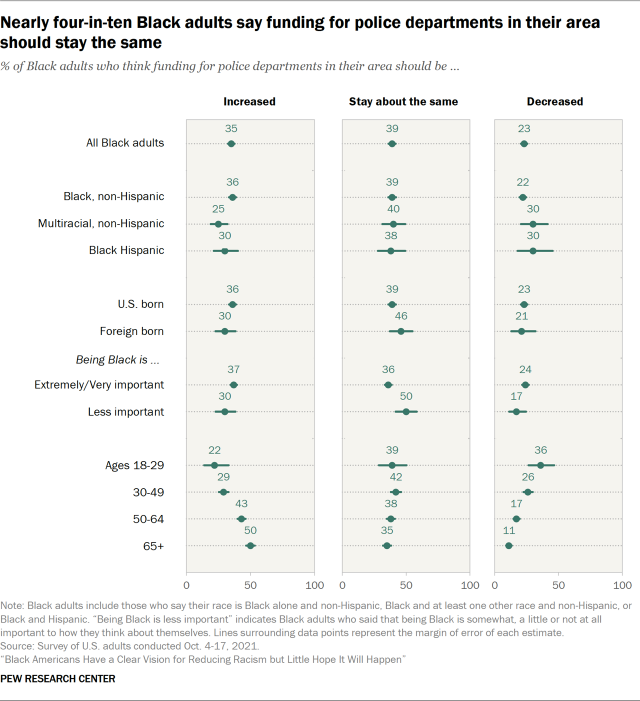
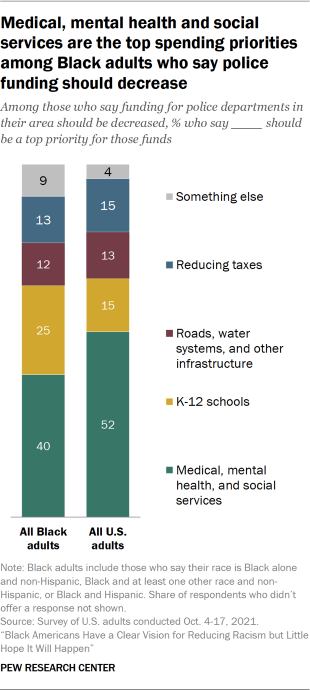
Overall, Black adults (35%) are less likely than the general U.S. public (48%) to say funding for police in their communities should be increased. And Black adults (23%) are more likely than the general public (13%) to say funding should be decreased.
Adults who say funding for police should decrease were asked which of the following should be the top priority for the reappropriated funds in their communities: medical, mental health, and social services; K-12 schools; roads, water systems and other infrastructure; reducing local taxes; or something else.
Both Black adults (40%) and the general public (52%) were most likely to say the reappropriated funds should go to medical, mental health and social services in their area. However, Black adults (25%) were slightly more likely than the general public (15%) to say that reappropriated funds should go to K-12 schools.


